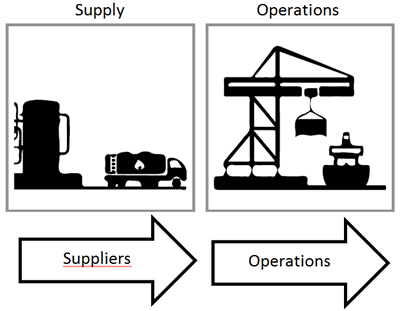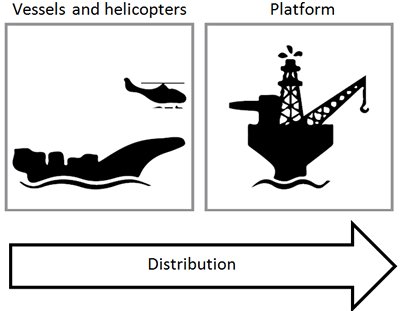Article No. 8 [UNCTAD Transport and Trade Facilitation Newsletter N°75 - Third Quarter 2017]
This article is based on: Castellanos, A., Lombana, J. y Ortiz, M. (2017). "Exploracio?n y explotacio?n de hidrocarburos aguas afuera (offshore): estrategia logi?stica para Barranquilla, una ciudad en transformacio?n". Equidad & Desarrollo", (28), 85-111.
The management of logistics within value chains allows improving competitive advantages in any given sector. A strategy based on improving the organization of related sectors (i.e. clustering) can contribute to strengthen those advantages.
Several coastal cities of Colombia aspire to become offshore logistic platforms. Barranquilla in particular is reflecting about changes required at the city level to maximize benefits from hydrocarbons offshore exploration and exploitation. Strengthening services associated with critical aspects of this activity is an important aspect of those reflections.
Based on a review of experiences used in other countries to develop the hydrocarbon exploration and exploitation offshore industry, the study provides reflections on policy design to enhance logistic services at the city level to support the development of this industry. This article is based on a longer study aimed at filling technical, regulatory gaps and research gaps in Colombia.
Why does Colombia prioritize the development of this industry?
The hydrocarbons exploration and exploitation sector is of high priority for Colombia. Its strategic nature stems from its increasing importance in GDP, the level of revenues it generates in the balance of payments, the weight of the sector in terms of FDI, its capacity to generate foreign exchange earnings and financing for the government through taxes and royalties(1) . Trade statistics also demonstrate the continued importance of this industry in Colombia's export basket, as shown in table 1.
| 2006 | 2007 | 2008 | 2009 | 2010 | 2011 | 2012 | 2013 | 2014 | 2015 | 2016 |
| 41% | 39% | 48% | 50% | 58% | 66% | 67% | 68% | 67% | 54% | 49% |
In spite of volatile international prices, Colombia believes this is an important sector that can contribute to the social development of the country. Strategies to develop this industry have sought to add value to production and exports.
Up until 2015, Colombia had 6.5 years of proven oil reserves and 15 years of gas reserves. To cope with a declining number of new continental fields for exploitation, many exporting countries, including Colombia, are embarking on the path of developing the offshore industry. According to Rodriguez (2015)(3) , Colombia has an offshore potential of 9'000 million barrels, out of which 2'400 million constitute proven reserves and the others are currently undergoing technical evaluation and exploration.
Colombia has promoted the development of the offshore industry since 2003, as a technological alternative to pursue oil exploration and exploitation. Colombia used strategic alliances with more advanced technological business partners, changing the regulatory framework, mainstreaming procedures to facilitate investment and providing fiscal incentives for offshore free zones. Several changes were also introduced to the institutional framework. For example, ECOPETROL created an entity responsible for the development of offshore operations. Another example of these changes is strengthening and improving coordination among entities in charge of approving and licensing offshore operations, and of defining technical parameters and rules for exploration, exploitation, production and export.
In the authors' view, for the offshore business to flourish in coastal cities of Colombia, these institutional and regulatory changes need to be accompanied with reforms aimed at developing logistics management and implementation, as well as infrastructure. To prove their point, they examine cases of other countries (and particularly of the city of Aberdeen, in the UK) that have successfully developed the offshore sector.
The importance of logistics
The offshore industry has been exploited for more than a century in Azerbaijan and California and grew significantly after Second World War. The development of a solid logistic sector features prominently in the case of successful offshore producers such as the United Stated, Mexico, Norway, Brazil and Saudi Arabia.
Suarez, Munevar, Amador and Alvarez (2015)(4) define offshore logistics as the process of planning, implementing and controlling the flow, availability and warehousing of products, inputs and minimum requirements at quay, such as cargo handling equipment, lines for process fluids, physical security of staff, (open and closed) storage areas, transport from the operation base to the offshore platform, contingency plans and legal processes that are necessary to undertake operations. Logistics also encompass information flows to satisfy the requirements of the offshore platform at the adequate moment, place and in the adequate manner.
Analysing the logistic chain allows identifying tasks, sectors and aspects that can be improved to maximize benefits from this sector. Figure 1 illustrates the simplified offshore logistics chain. Services and related sectors that can contribute to the offshore logistic chain are listed in table 2.


| Direct linkages | Specialized services | Indirect linkages |
|
|
|
Considerations to ensure that Barranquilla becomes an optimal regional platform for the offshore business
The study identifies some challenges for the development of this industry in Colombia and particularly for coastal cities to attract offshore operations and investment in this sector in the next 4 to 5 years, for instance:
Reduced prices and reduced margins affecting the industry at the global level
The need to improve incentives and local conditions to attract investment
The need to upgrade regulatory frameworks to reflect the specific challenges and realities of the offshore exploration and exploitation (which are different from the continental one) and to appropriately address potential negative environmental and social externalities.
It also highlights the role of the government designing policies enabling adjustments that maximize impact on the scale on productive apparatus. Examining more closely the case of the city of Aberdeen, a qualified workforce and adequate infrastructure appear as important pre-requisites for the development of the sector.
The three key success factors identified in the case of Aberdeen included:
Cooperation between government and university to ensure an adequate pool of skilled professionals, who are in a position to add value to services through innovation. This is the case, for example, of use of new technologies (applicable to security assurance, maintenance and extraction of marginal resources) or software development for cost-reduction and inventory management.
Appropriate port and airport infrastructure. Special needs of offshore operations regarding ports include: ensuring sufficient draught to enable loading and unloading of equipment, availability of warehousing services, fuel supply, heavy lifting cranes, and forklifts and a sufficient number of quays to minimize unloading delays. Airport infrastructure needs relate to one "logistics" airport enabling cargo handling, operation of support helicopters to ensure transport on the deep seas.
A clear strategy identifying the different sectors that are expected to leverage the logistic chain; articulating issues related to these sectors with a long-term vision and defining cross-cutting objectives.
On the basis of the example, the study suggests developing a value proposition based on an Integrated Development Plan to improve the competitiveness of the logistic chain in Barranquilla. This exercise entails mapping the needs of the main client (i.e. the offshore platform) at different stages of the chain (supply, operations and distribution), as well as:
Identifying, preparing and making available the required infrastructure and related services (whether direct, indirect or specialized), prioritizing certain activities where the region has greater strength or potential. The study emphasizes that some services, inputs and technology will have to be imported.
Facilitating the insertion of local businesses in the offshore logistic chain, developing their capacity to become suppliers of inputs and workforce, once offshore companies start operations. Improving the interaction among different sectors and activities is important to avoid generating high operational costs. To address this, the study suggests a focus on strengthening and streamlining systems related to the purchase and delivery of materials and inputs, which determines to a great extent the capacity to take advantage of outsourcing opportunities locally.


